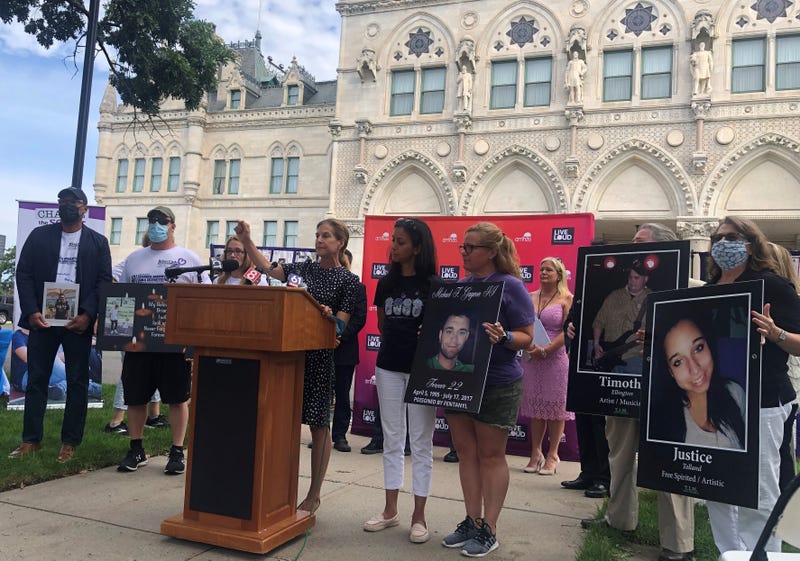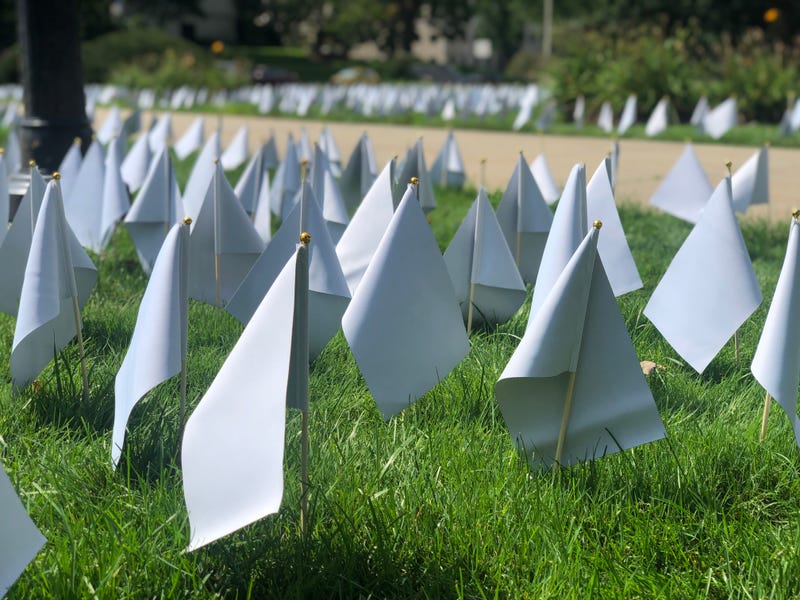
HARTFORD, Conn. (WTIC Radio)—In recognition of International Overdose Awareness Day, 1,374 white flags were planted on the State Capitol lawn Tuesday to represent the number of lives lost to drug overdoses in Connecticut throughout 2020.
Numerous Connecticut officials, addiction recovery groups and recovery advocates spoke at an event while overlooking the flags, including Department of Mental Health and Addiction Services (DMHAS) Acting Commissioner Nancy Navarretta.
Of the 1,374 drug overdose deaths in 2020, 1,273 of them involved opioids, Navarretta said. The sharp rise in fatalities, she explained, is related to the opioid fentanyl.
Governor Ned Lamont, along with many other state officials, is calling for further action and resources in the fight against the opioid crisis.
"I just think of fentanyl as an assault weapon and there's somebody putting that assault weapon up there," Lamont said while pointing to his head, "and they got their finger on that trigger, and I think they are murderers, and I think they should be held accountable."

Attorney General William Tong stressed that the fight against the nation's largest opioid manufacturers continues, even after securing a multi-state $26 billion settlement.
"26 billion dollars, yeah, that's a big number, but it's just another step in a fight that for most of [the families of an opioid overdose victim] will go on for the rest of [their] lives. There will never be enough money. There will never be enough justice for the families here," Tong said.
Connecticut's $300 million share of the billion-dollar settlement will go toward opioid addiction services and resources.
According to Tong, the focus is now on Purdue Pharma which is currently seeking a multibillion-dollar bankruptcy settlement.
Many people held signs with photos of loved ones that died due to an overdose, such as John Lally with the Ellington nonprofit Today I Matter.
Lally shared the story of his son Timothy Lally who died of a heroin overdose in 2016. According to John Lally, Timothy tried various treatments after struggling daily with severe depression and anxiety. None of them worked until Timothy took an opioid pill, he said.
"He had a choice the first day he picked up that pill, but then it was taken away from him. That's where the disease kicked in. He could no longer think clearly. His brain was altered. His reasoning, his judgement, his impulse control was destroyed by these opiates," John Lally said.
He stressed the fact that every single flag on the Capitol lawn has a similar story attached to it.
Michael Serrano with the Connecticut Community for Addiction Recovery (CCAR) urged those who are currently struggling to find help, reminding them that recovery is possible.
He described himself as a person in long-term recovery, which means he has not used a mind-altering substance since October of 2014.
"I want you to be aware that there are five recovery community centers--CCAR recovery community centers--throughout Connecticut: Hartford, Manchester, Willimantic, New Haven, and Bridgeport," he said.
Additional information and resources for addiction recovery or treatment can be found through DMHAS, DrugFreeCT or LiveLOUD.
